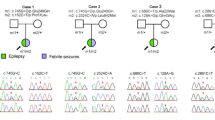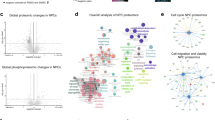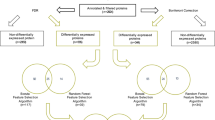Abstract
Epilepsy affects more than 0.5% of the world population and is known to be associated with a large genetic component eliciting an electrical hyperexcitability in the central nervous system. However, its pathogenic mechanisms remain poorly understood. In order to gain greater molecular incite in the pathogenesis in epilepsy, we analyzed proteomes of human cerebral cortices. Quantitative proteome analysis was used to compare signals corresponding to individual proteins between epileptic cerebral cortices from patients with temporal lobe epilepsy and age-matched non-epileptic subjects. To minimize individual variations, gender and age of the patients were matched. Changes of several spots were consistent among 6 pairs of epileptic patients and nonepileptic subjects. One of the spots was identified as the mitochondrial type Mn-superoxide dismutase (Mn-SOD) confirmed by Western blot analysis with Mn-SOD antibody and enzyme activity assay. Such results were agreeable with chemical and physical parameters given by the 2-dimensional electrophoresis (2-DE) gel. Mn-SOD was consistently down-regulated in epileptic cerebral cortices compared with those of nonepileptic subjects. Our results demonstrate a clear link between pathogenesis of epilepsy and SOD. Additionally, we identified four proteins that were consistently over-expressed in all epileptic temporal neocortices specimens and the other four proteins that were found to be expressed less than non-epileptic control subjects. These proteomic data provide cellular markers in the understanding mechanism of the epilepsy pathogenesis.
Similar content being viewed by others
Article PDF
Author information
Authors and Affiliations
Rights and permissions
This is an Open Access article distributed under the terms of the Creative Commons Attribution Non-Commercial License (http://creativecommons.org/licenses/by-nc/3.0/) which permits unrestricted non-commercial use, distribution, and reproduction in any medium, provided the original work is properly cited.
About this article
Cite this article
Eun, JP., Choi, HY. & Kwak, YG. Proteomic analysis of human cerebral cortex in epileptic patients. Exp Mol Med 36, 185–191 (2004). https://doi.org/10.1038/emm.2004.26
Published:
Issue date:
DOI: https://doi.org/10.1038/emm.2004.26
Keywords
This article is cited by
-
Characterization of the rat cerebrospinal fluid proteome following acute cerebral ischemia using an aptamer-based proteomic technology
Scientific Reports (2018)
-
Blood DNA methylation pattern is altered in mesial temporal lobe epilepsy
Scientific Reports (2017)



